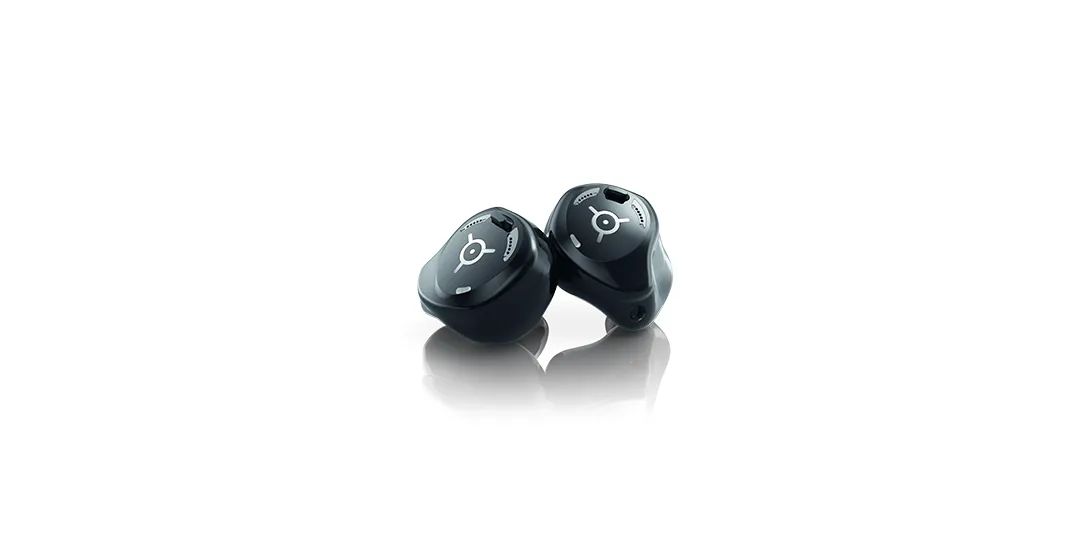How to Choose the Best Noise-Cancelling Headphones | Connect Hearing

How to Choose the Best Noise-Cancelling Headphones | Connect Hearing
9 min.
Publication Date: June 19, 2021
If you are a commuter and travel by air, train, or public transportation, noise-cancelling headphones may be a perfect solution for a relaxing trip. Forget the noise and distractions. Settle in for your favorite podcast or latest playlist and you'll be at your destination in no time.
First introduced to the public by Bose in 2000, noise cancellation technology has been steadily improving ever since. The crispness of the sound, along with the size and comfort of the headphones, put these at the top of holiday gift lists around the world.
Today, noise-cancelling headphones come in all sizes from full-size headphones to wireless earbuds that fit in your pocket. And due to improvements in battery life, you never have to be without your wireless headphones again.
Noise Cancellation Technology
How can you "cancel" the noise outside when wearing headphones while not damaging the quality of sound within the headphones?
If you could visualize sound waves (or pressure waves), they would probably look like a roller coaster with peaks and valleys. These peaks and valleys are the waves that our brains interpret as sound. The simple answer is by creating a similar noise with the same amplitude that offsets the external noise source, you create a situation where the sound waves literally "cancel" each other out.
Developed as a way to protect pilots’ ears when flying loud planes, noise cancellation technology uses Active Noise Control (ANC) to block out unwanted ambient noise. Using a tiny microphone that captures the external lower-frequency sound, an internal amplifier then repeats the noise “out-of-sync”. When the external sound waves are at high peaks, the amplifier sound is at the low range of the sound waves, and they in effect collide with one eliminating the other.
Noise-cancelling works especially well for low-frequency, droning sounds like the sounds of airplane engines or machinery. Noise-cancelling headphones are less effective with high-frequency sounds or sounds that are short or sharp like laughter or breaking glass.
Noise Cancelling Earbuds vs Noise Cancelling Headphones
When it comes to noise-cancelling equipment, you have two basic choices - earbuds or headphones. But what are the pros and cons of each and how do you make the best decision about which type to buy?
Noise Cancelling Earbuds
Like regular earbuds that you use for a smartphone, in-ear noise-cancelling earbuds fit directly into the ear canal so you get partial noise isolation to stop external sound. Unfortunately, they aren't able to stop high-frequency sounds as well as padded over-the-ear headphones.
PROS
- Compact and Convenient - you can easily take them anywhere. Wired or wireless, in-ear earbuds are easy to use and fit in your pocket, briefcase, or backpack.
- Inexpensive - earbuds that are noise-cancelling are generally much less expensive than most headphone sets.
CONS
- Potential Hearing Loss - One of the great selling points of noise-cancelling equipment is that you can listen to programming at a lower volume. With less distraction, you can concentrate on your music or podcast at a lower setting that's safer for your hearing. But wireless earbuds play sound directly into your ear canal where there is a greater risk of damage.
- Quality of Sound - The level of sound quality found in earbuds offering noise cancellation is not on par with a headphone. Lacking bass-forward tones that an over-ear headphone can offer, earbuds simply can't recreate the same experience.
- More Delicate - Compared to noise-cancelling headphones, earbuds are portable, but also easy to break or damage.
Noise-Cancelling Headphones
To start, noise-cancelling headphones can stop an additional 20 decibels of exterior sound with their padded over-ear design.
PROS
- Healthy for Your Ears - Because of the noise cancellation technology, good base range, and excellent sound quality, you can listen to programming at a lower level. All the better for your ears!
- Full-Range Sound Quality - Since on-ear headphones cancel low to mid-range frequency sound and the over-ear padded design cancels high-frequency noise, you experience an overall better sound.
- Ability to Focus - Unnecessary background noise is cut down so that you are better able to focus and concentrate.
CONS
Cost - Without a doubt, noise-cancelling headphones are much more expensive than their less expensive earbud counterparts. They can be an investment.
Power - On-ear headphones tend to use much more battery life to operate and require frequent recharging. Wired headphones don't have the same problem but also aren't as convenient to wear.
Less Comfortable to Wear - Let's face it. They're bulky and can be uncomfortable to wear, especially for long periods.
Why Do I Feel Dizzy?
Wireless headphones and earbuds eliminate most ambient noise both actively and passively. This can affect some people's equilibrium. It makes them feel dizzy. Occasionally, people have reported a feeling similar to motion sickness.
While using your best judgment, the feeling should go away once you become acclimated to your new headphones.
Noise-Cancelling Headphone Use for Health-Related Issues
The use of noise-cancelling headphones and earbuds has proven effective with some health-related issues. In addition to helping prevent hearing loss with sound quality that doesn't require high volume, noise-cancelling technology is proving useful with the following:
Sleeping disorders and insomnia - Whether due to a partner that snores, depression, or a stress-related problem, noise-cancelling headphones are allowing people to finally get the sleep they crave.
Autism Spectrum Disorder - ANC headphones may help children with autism to develop better coping skills. It may also help with behaviours like hyperactivity or extreme reactions to auditory stimuli.
Summary
When choosing the best noise-cancelling technology, it's important to understand the differences both good and bad. Not only is price a consideration, but also portability, convenience, and your desired level of sound quality.
Whether you choose an over-the-ear or in-ear option, noise-cancelling technology allows you to relax and enjoy your commute or airplane flight like never before. It's easy to see why noise-cancelling headphones are constantly topping the lists of essential travel gadgets.
Contact Sonova to see the many options of wired and wireless headphone and earbud options available.



